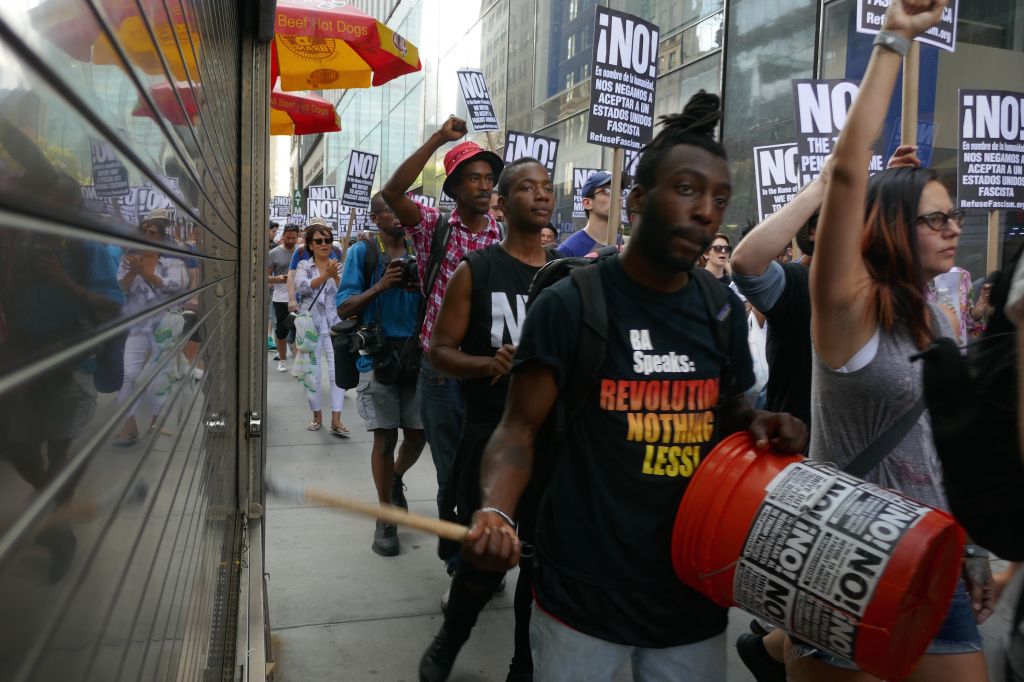
Source: Anadolu Agency / Getty
I wake up before America. Not in an abstract, activist-minded way, but literally. I live in Lisbon, Portugal, meaning when I wake up, America is still asleep. It also means that when I check the news apps on my iPhone, while my head is still on my pillow, there is no one to call or text to ask, “What the fuck?” Or, when I don’t have it in me to curse, “For real?”
I didn’t have to ask either of those questions on Saturday (August 12) when I woke up to news of the white supremacist march on the campus of the University of Virginia (UVA) that happened while I was sleeping. Because, yes, for real—and also, yes, of course. These racists have been encouraged, inspired—and directly rewarded if you are Steve Bannon, Jeff Sessions and friends—since Donald Trump’s election to the presidency.
So I got up, no questions asked. And then I went to lunch with a white American expat who also lives in Lisbon. He seemed mildly interested when I told him about the UVA march, but grew animated as he asked if I thought the media should just “ignore” things like this. “What if covering it just fans the flames of something small and fringe?” he asked, with a straight face.
I used Saturday’s “What the fuck?” on him, except it came across as a blank stare followed by a sip of water as I willed the lunch to be over so I could text a Black American. Someone had to be awake. By the time I got home, Charlottesville was in explosive disarray. The only calm presence were the cops, who seemed to be doing nothing as Klansmen (and women), Nazis and other proud white supremacists marched against, threatened, peppered spray and, eventually, used a car to run over those who had come out to stand against them. In a string of sad days for America since November 8, this was one of the saddest.
That was Saturday. Sunday morning I woke to an image of Deandre Harris, who Google told me was a 20-year-old Black man living in Charlottesville. Before I knew his name, I saw him on his hands and knees in a picture tweeted by a reporter, as several white men beat him with poles. Behind them, not very far away at all, were armed police officers with their backs turned.
In a string of sad days for America since November 8, this was one of the saddest.
I’m often asked, “What do you miss about the U.S.?” The answer is always the same: “I miss home.” That is shorthand for my family, friends, and my actual house in Brooklyn. But it also means something that is much more abstract: I miss the home of Black people. That sounds like an old Starz in Black movie tagline, but it is a very real thing based on a lifetime of being a Black American.
Yes, there are Black people here in Portugal—more than you’ll find in Spain and some other European countries. But we are strangers to each other in so many ways, beginning with the fact that my Portuguese is terrible. But even if we were all the best of friends, I would still be homesick. That photograph of Deandre Harris left me doubled over in my kitchen chair crying for a good part of the morning. This was home. The white men slamming poles down on a Black body trying to get away on hands and knees—they, too, are a disgusting part of my American home. And the armed officers nearby doing nothing, though I am sure Harris must have been shouting—maybe even begging—for someone to please help him, their refusal to even turn around and act concerned is also a part of the institutionalized, systemic hate that is part of my home.
But Deandre Harris is the home I miss. He looked so young. And so vulnerable, unarmed and on the ground. And so much like my nephew that it is hard to type this. He looked like all of us. He was all of us to those men with pipes, just a nigger that they would have killed if his friends had not found and saved him. But, like so many of us, he was fighting back. Because this might be “yes, for real,” but Black people have always maintained it will not be “yes, always.”
There aren’t enough miles to make what I saw feel foreign or far away. Distance doesn’t dilute rage. Or fear. Because home lives in this place that is fragile and forever.
Ayana Byrd is a journalist writing her first novel in Lisbon, Portugal.
















